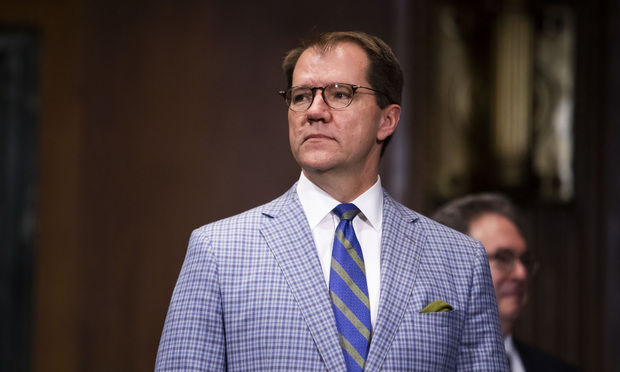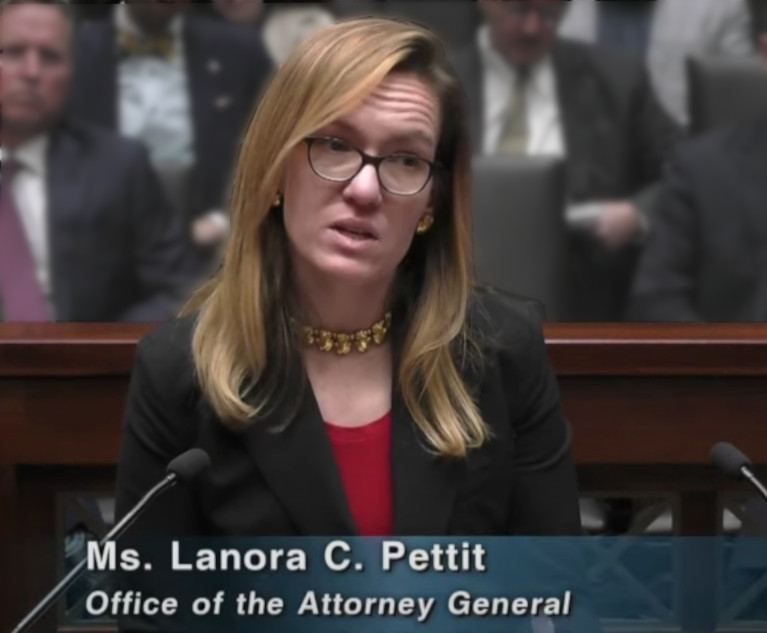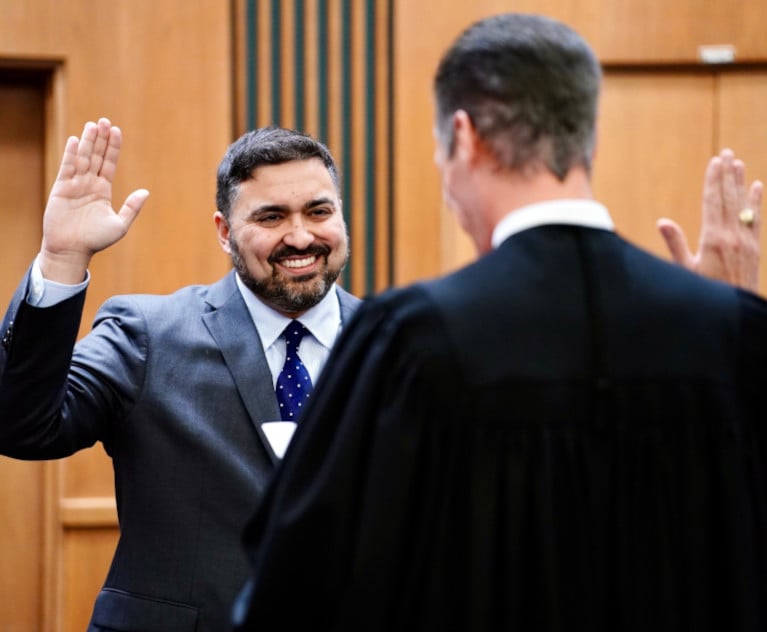'Judicial Change of Heart': Judge Willett Changes his Mind in Ruling Against Black Lives Matter Organizer
"Further reflection has led me to see this case differently. Admittedly, judges aren't naturals at backtracking or about-facing. But I do so forthrightly," Willet wrote in splitting with his colleagues.
December 17, 2019 at 02:46 PM
5 minute read
 Judge Don Willett of the U.S. Court of Appeals for the Fifth Circuit, attends a Senate Judiciary Committee hearing. Photo: Photo: Diego M. Radzinschi/ALM
Judge Don Willett of the U.S. Court of Appeals for the Fifth Circuit, attends a Senate Judiciary Committee hearing. Photo: Photo: Diego M. Radzinschi/ALM
A federal appeals court has withdrawn an opinion after a judge on the panel had a rare change of heart over whether a police officer can hold a Black Lives Matter organizer liable for injuries he suffered when a protester threw a rock at his face.
Judge Don Willett originally sided with two of his colleagues on the U.S. Court of Appeals for the Fifth Circuit in August in rejecting Black Lives Matter organizer DeRay Mckesson's argument that the First Amendment protected him from the officer's claims. The officer, identified as John Doe, claimed Mckesson was at fault for inciting the violence, failing to calm the crowd, and leading protesters that blocked a highway.
The panel on Monday withdrew the unanimous August opinion and issued a new one in which Willett took a vastly different position after having a"judicial change of heart."
"Further reflection has led me to see this case differently," Willett wrote in his partial dissent. "Admittedly, judges aren't naturals at backtracking or about-facing. But I do so forthrightly. Consistency is a cardinal judicial virtue, but not the only virtue. In my judgment, earnest rethinking should underscore, rather than undermine, faith in the judicial process. "
Willett, a former Texas Supreme Court justice who was nominated to the Fifth Circuit by President Donald Trump in 2017, wrote in his dissent that "the rub" was whether Mckesson strayed from his own lawful exercise of rights, to unlawfully harming the officer's rights.
"The majority is too quick to conclude that Mckesson's organization and leadership of the Black Lives Matter protest amounted to negligence," Willett said. "I am unaware of any Louisiana case imposing a duty to protect against the criminal acts of a third party."
Whether Louisiana law created such a duty should have been a question certified to the Louisiana Supreme Court, Willett wrote.
Willett wrote that the officer's allegations didn't have specific details about what Mckesson did or said to incite the violence, and it didn't overcome Mckesson's First Amendment defense.
"In Hong Kong, millions of defiant pro-democracy protesters have taken to the streets, with demonstrations growing increasingly violent. In America, political uprisings, from peaceful picketing to lawless riots, have marked our history from the beginning," Willett wrote. "The Constitution does not insulate violence, but it does insulate citizens from responsibility for others' violence."
The majority opinion—which reached the same decision as two previous opinions in April and August that Willett had joined in—addressed and rejected much of Willett's dissent.
"Mckesson failed to exercise reasonable care in conducting his demonstration. This is not, as the dissenting opinion contents, a 'duty to protect others from the criminal activities of third persons,'" said the majority opinion. "Louisiana does not recognize such a duty. It does, however, recognize a duty not to negligently cause a third party to commit a crime that is a foreseeable consequence of negligence."
The trial court dismissed the officer's claims for failure to state a claim. Writing for the majority, Judge E. Grady Jolly, joined by Judge Jennifer Walker Elrod, wrote that it was an error for the district court to dismiss one of the claims for negligence against Mckesson based on a First Amendment defense.
Louisiana law would allow a claim to proceed on the officer's plausible allegations that Mckesson was negligent for leading the protest because he knew or should have known it would turn violent. Mckesson made the plan to block the highway, a crime under Louisiana law. He should have known officers would have to clear the highway and possibly make arrests, which could turn violent, the majority ruled.
"We perceive no constitutional issue with Mckesson being held liable for injuries caused by a combination of his own negligent conduct and the violent actions of another that were foreseeable as a result of that negligent conduct," the opinion said.
The officer's attorney, Donna Unkel Grodner of Grodner & Associates in Baton Rouge, didn't immediately respond to a request seeking comment.
The new ruling's timing surprised David Goldberg, who represents Mckesson, since he filed a writ of certiorari with the U.S. Supreme Court on Dec. 6.
"I thought his dissent was extremely compelling and certainly correct on the First Amendment," said Goldberg, partner in Donahue, Goldberg, Weaver & Littleton in Brooklyn. "We appreciate that it's an unusual thing to happen in a federal appellate decision."
The Fifth Circuit decided the case the same way in April, but Mckesson requested a rehearing in June, arguing that the opinion contradicted a 1982 U.S. Supreme Court case, NAACP v. Claiborne Hardware Co. The case discussed the limits the First Amendment sets on a state's ability to impose civil liability for violence that arose out of constitutionally protected activity.
The Fifth Circuit next issued its August ruling, which reached the same decision, but added that the Claiborne Hardware case did not show the Supreme Court wanted "to restructure state tort law by eliminating this principle of negligence liability." The difference in the December ruling is that Willett dissented and the majority added sections to its opinion to address his dissent.
Read the opinion:
This content has been archived. It is available through our partners, LexisNexis® and Bloomberg Law.
To view this content, please continue to their sites.
Not a Lexis Subscriber?
Subscribe Now
Not a Bloomberg Law Subscriber?
Subscribe Now
NOT FOR REPRINT
© 2025 ALM Global, LLC, All Rights Reserved. Request academic re-use from www.copyright.com. All other uses, submit a request to [email protected]. For more information visit Asset & Logo Licensing.
You Might Like
View All


Trending Stories
- 1States Accuse Trump of Thwarting Court's Funding Restoration Order
- 2Microsoft Becomes Latest Tech Company to Face Claims of Stealing Marketing Commissions From Influencers
- 3Coral Gables Attorney Busted for Stalking Lawyer
- 4Trump's DOJ Delays Releasing Jan. 6 FBI Agents List Under Consent Order
- 5Securities Report Says That 2024 Settlements Passed a Total of $5.2B
Who Got The Work
J. Brugh Lower of Gibbons has entered an appearance for industrial equipment supplier Devco Corporation in a pending trademark infringement lawsuit. The suit, accusing the defendant of selling knock-off Graco products, was filed Dec. 18 in New Jersey District Court by Rivkin Radler on behalf of Graco Inc. and Graco Minnesota. The case, assigned to U.S. District Judge Zahid N. Quraishi, is 3:24-cv-11294, Graco Inc. et al v. Devco Corporation.
Who Got The Work
Rebecca Maller-Stein and Kent A. Yalowitz of Arnold & Porter Kaye Scholer have entered their appearances for Hanaco Venture Capital and its executives, Lior Prosor and David Frankel, in a pending securities lawsuit. The action, filed on Dec. 24 in New York Southern District Court by Zell, Aron & Co. on behalf of Goldeneye Advisors, accuses the defendants of negligently and fraudulently managing the plaintiff's $1 million investment. The case, assigned to U.S. District Judge Vernon S. Broderick, is 1:24-cv-09918, Goldeneye Advisors, LLC v. Hanaco Venture Capital, Ltd. et al.
Who Got The Work
Attorneys from A&O Shearman has stepped in as defense counsel for Toronto-Dominion Bank and other defendants in a pending securities class action. The suit, filed Dec. 11 in New York Southern District Court by Bleichmar Fonti & Auld, accuses the defendants of concealing the bank's 'pervasive' deficiencies in regards to its compliance with the Bank Secrecy Act and the quality of its anti-money laundering controls. The case, assigned to U.S. District Judge Arun Subramanian, is 1:24-cv-09445, Gonzalez v. The Toronto-Dominion Bank et al.
Who Got The Work
Crown Castle International, a Pennsylvania company providing shared communications infrastructure, has turned to Luke D. Wolf of Gordon Rees Scully Mansukhani to fend off a pending breach-of-contract lawsuit. The court action, filed Nov. 25 in Michigan Eastern District Court by Hooper Hathaway PC on behalf of The Town Residences LLC, accuses Crown Castle of failing to transfer approximately $30,000 in utility payments from T-Mobile in breach of a roof-top lease and assignment agreement. The case, assigned to U.S. District Judge Susan K. Declercq, is 2:24-cv-13131, The Town Residences LLC v. T-Mobile US, Inc. et al.
Who Got The Work
Wilfred P. Coronato and Daniel M. Schwartz of McCarter & English have stepped in as defense counsel to Electrolux Home Products Inc. in a pending product liability lawsuit. The court action, filed Nov. 26 in New York Eastern District Court by Poulos Lopiccolo PC and Nagel Rice LLP on behalf of David Stern, alleges that the defendant's refrigerators’ drawers and shelving repeatedly break and fall apart within months after purchase. The case, assigned to U.S. District Judge Joan M. Azrack, is 2:24-cv-08204, Stern v. Electrolux Home Products, Inc.
Featured Firms
Law Offices of Gary Martin Hays & Associates, P.C.
(470) 294-1674
Law Offices of Mark E. Salomone
(857) 444-6468
Smith & Hassler
(713) 739-1250







